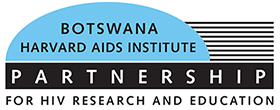Botswana–Harvard AIDS Institute Partnership
== Botswana–Harvard AIDS Institute Partnership ==
The Botswana–Harvard AIDS Institute Partnership (BHP) is a collaborative research and training initiative between the Government of Botswana and the Harvard T.H. Chan School of Public Health. Established in 1996, the partnership aims to combat the HIV/AIDS epidemic in Botswana through research, education, and capacity building.
History[edit | edit source]
The BHP was founded in response to the severe impact of the HIV/AIDS epidemic in Botswana. The partnership was initiated by Dr. Max Essex, a prominent HIV/AIDS researcher, and supported by the Government of Botswana. The collaboration has since grown to include various research projects, clinical trials, and public health initiatives.
Objectives[edit | edit source]
The primary objectives of the BHP are:
- To conduct cutting-edge research on HIV/AIDS and related diseases.
- To provide training and education to healthcare professionals in Botswana.
- To develop and implement effective public health interventions.
- To strengthen the healthcare infrastructure in Botswana.
Research[edit | edit source]
The BHP conducts a wide range of research activities, including:
- Epidemiology studies to understand the spread and impact of HIV/AIDS in Botswana.
- Clinical trials to test new treatments and interventions for HIV/AIDS.
- Behavioral research to identify factors influencing HIV transmission and prevention.
- Studies on co-infections such as tuberculosis and hepatitis.
Training and Education[edit | edit source]
The BHP offers various training programs for healthcare professionals, including:
- Workshops and seminars on HIV/AIDS prevention and treatment.
- Fellowships and scholarships for advanced studies in public health.
- On-the-job training for healthcare workers in Botswana.
Public Health Initiatives[edit | edit source]
The BHP has implemented several public health initiatives to combat HIV/AIDS, including:
- The Prevention of Mother-to-Child Transmission (PMTCT) program.
- Community outreach and education campaigns.
- Support for antiretroviral therapy (ART) programs.
Impact[edit | edit source]
The BHP has made significant contributions to the fight against HIV/AIDS in Botswana. Some of the notable achievements include:
- Reduction in the rate of mother-to-child transmission of HIV.
- Increased access to antiretroviral therapy for people living with HIV.
- Enhanced capacity of the healthcare system to manage HIV/AIDS.
Future Directions[edit | edit source]
The BHP continues to evolve and expand its efforts to address the HIV/AIDS epidemic. Future directions include:
- Expanding research on emerging health issues in Botswana.
- Strengthening collaborations with other international research institutions.
- Enhancing the sustainability of public health programs in Botswana.
See Also[edit | edit source]
- HIV/AIDS in Botswana
- Harvard T.H. Chan School of Public Health
- Max Essex
- Prevention of Mother-to-Child Transmission (PMTCT)
- Antiretroviral therapy (ART)
References[edit | edit source]
External Links[edit | edit source]
Search WikiMD
Ad.Tired of being Overweight? Try W8MD's NYC physician weight loss.
Semaglutide (Ozempic / Wegovy and Tirzepatide (Mounjaro / Zepbound) available. Call 718 946 5500.
Advertise on WikiMD
|
WikiMD's Wellness Encyclopedia |
| Let Food Be Thy Medicine Medicine Thy Food - Hippocrates |
Translate this page: - East Asian
中文,
日本,
한국어,
South Asian
हिन्दी,
தமிழ்,
తెలుగు,
Urdu,
ಕನ್ನಡ,
Southeast Asian
Indonesian,
Vietnamese,
Thai,
မြန်မာဘာသာ,
বাংলা
European
español,
Deutsch,
français,
Greek,
português do Brasil,
polski,
română,
русский,
Nederlands,
norsk,
svenska,
suomi,
Italian
Middle Eastern & African
عربى,
Turkish,
Persian,
Hebrew,
Afrikaans,
isiZulu,
Kiswahili,
Other
Bulgarian,
Hungarian,
Czech,
Swedish,
മലയാളം,
मराठी,
ਪੰਜਾਬੀ,
ગુજરાતી,
Portuguese,
Ukrainian
Medical Disclaimer: WikiMD is not a substitute for professional medical advice. The information on WikiMD is provided as an information resource only, may be incorrect, outdated or misleading, and is not to be used or relied on for any diagnostic or treatment purposes. Please consult your health care provider before making any healthcare decisions or for guidance about a specific medical condition. WikiMD expressly disclaims responsibility, and shall have no liability, for any damages, loss, injury, or liability whatsoever suffered as a result of your reliance on the information contained in this site. By visiting this site you agree to the foregoing terms and conditions, which may from time to time be changed or supplemented by WikiMD. If you do not agree to the foregoing terms and conditions, you should not enter or use this site. See full disclaimer.
Credits:Most images are courtesy of Wikimedia commons, and templates, categories Wikipedia, licensed under CC BY SA or similar.
Contributors: Prab R. Tumpati, MD

